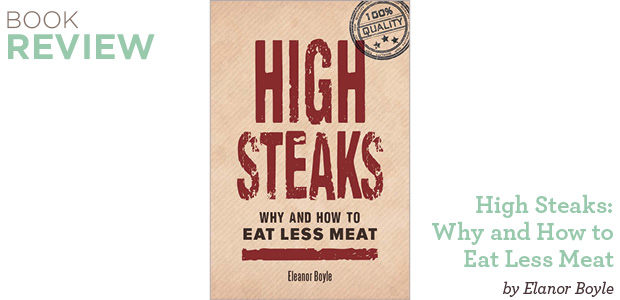Advertisement
Book review
High Steaks: Why and How to Eat Less Meatby Eleanor BoyleNew Society Publishers, 2012, 247 pages, $17.95ISBN: 978-0-86571-713-8 I don’t think anyone could have wrangled this important and delicate subject better than Canadian author Eleanor Boyle. The highly accredited educator specializes in food policy, food systems, and sustainability. But expertise alone is not enough. Boyle … Continued

High Steaks: Why and How to Eat Less Meat
by Eleanor Boyle
New Society Publishers, 2012, 247 pages, $17.95
ISBN: 978-0-86571-713-8
I don’t think anyone could have wrangled this important and delicate subject better than Canadian author Eleanor Boyle. The highly accredited educator specializes in food policy, food systems, and sustainability. But expertise alone is not enough. Boyle is also a highly organized facilitator, adept at communicating hard truths. High Steaks was released last fall, as Canada experienced its largest ever beef recall. Were it not for these combined factors, this important book may not have received the notice it so deserves.
Think of High Steaks as the modern omnivore’s guide to cutting meat. The book compels readers to sharpen their awareness instead of their knives and gently push meat from the centre to the side of the plate. Facts are facts, but when presented in Boyle’s balanced manner and without hysteria we’re better able to hear the message. High Steaks is a meticulously referenced and articulate analysis of how our society’s endorsement of meat industry practices affects the health of its people and the environment.
The reasons for eating less meat are clearly laid out and multiple rationales are set before us. Boyle’s grounds for sustainability appeal to both logic and emotions, and for each reader some facts will resonate more, and some less. There are statistics for our rise up the food chain, the effects of meat waste on methane levels, and even how First World diets affect Third World health. Consider the use of pharmaceuticals, antibiotics, and growth hormones in the livestock that ends up on our plates, and it gets easier to push that meat to the side.
I found myself applauding Boyle with every page turned. High Steaks is far from being the sombre, fact-filled report it could have been in the hands of another author. Instead, among the pages we find photos and personal observations that reflect the highs and lows of Boyle’s research trips. There are poignant accounts of soul-searching farmers who question and oppose intense livestock farming practices. There are strategies for consuming less meat. An appendix gives tips and recipes for reducing meat in easy and tasty ways.
Boyle brings personal meaning to the words “food policy” in what I consider highly recommended reading for intelligent meat eaters.





